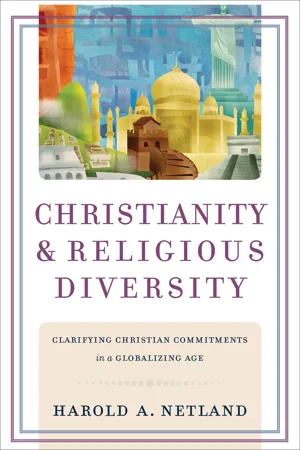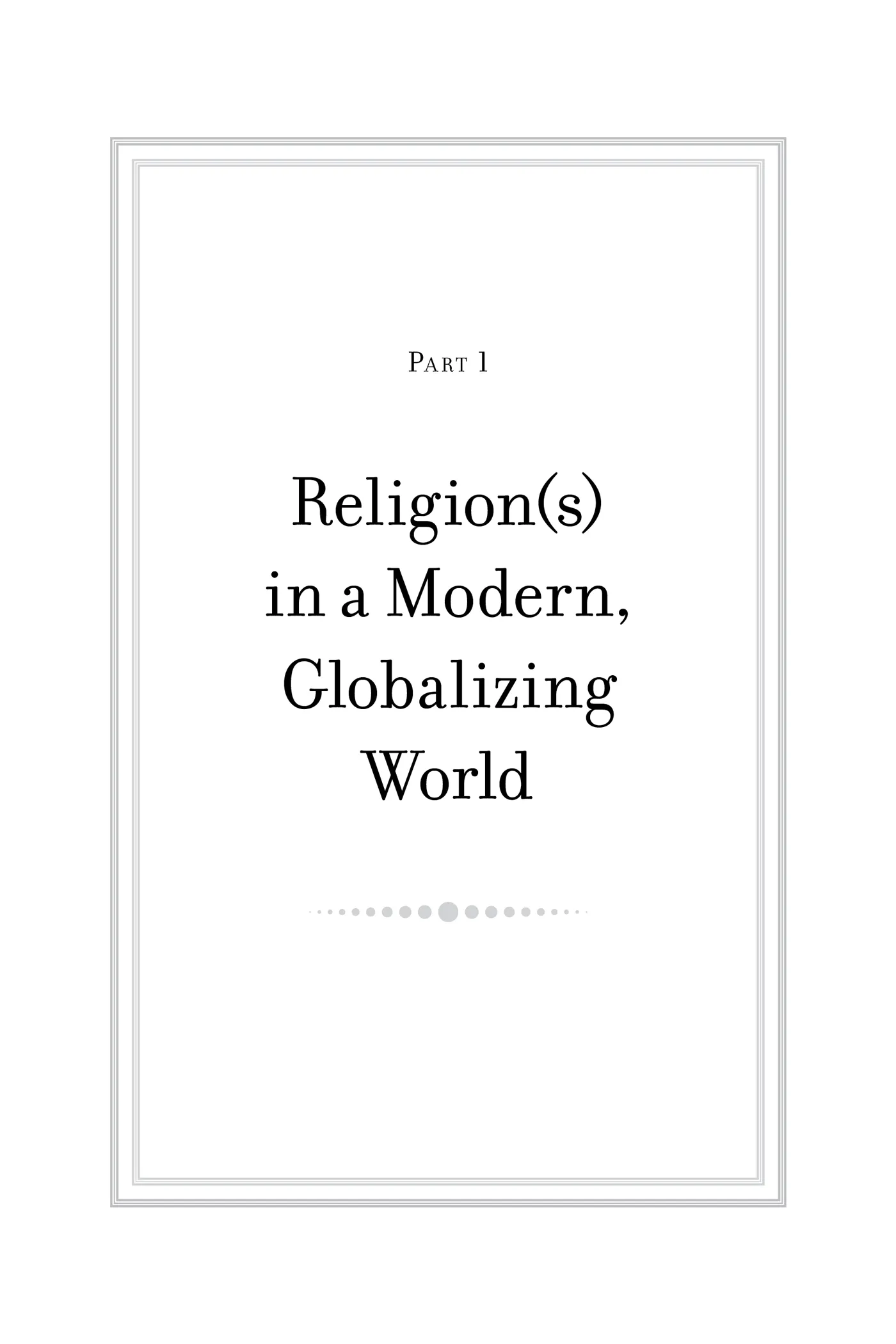
eBook - ePub
Christianity and Religious Diversity
Clarifying Christian Commitments in a Globalizing Age
- 304 pages
- English
- ePUB (mobile friendly)
- Available on iOS & Android
eBook - ePub
Christianity and Religious Diversity
Clarifying Christian Commitments in a Globalizing Age
About this book
This book explores how religions have changed in a globalized world and how Christianity is unique among them. Harold Netland, an expert in philosophical aspects of religion and pluralism, offers a fresh analysis of religion in today's globalizing world. He challenges misunderstandings of the concept of religion itself and shows how particular religious traditions, such as Buddhism, undergo significant change with modernization and globalization. Netland then responds to issues concerning the plausibility of Christian commitments to Jesus Christ and the unique truth of the Christian gospel in light of religious diversity. The book concludes with basic principles for living as Christ's disciples in religiously diverse contexts.
Frequently asked questions
Yes, you can cancel anytime from the Subscription tab in your account settings on the Perlego website. Your subscription will stay active until the end of your current billing period. Learn how to cancel your subscription.
No, books cannot be downloaded as external files, such as PDFs, for use outside of Perlego. However, you can download books within the Perlego app for offline reading on mobile or tablet. Learn more here.
Perlego offers two plans: Essential and Complete
- Essential is ideal for learners and professionals who enjoy exploring a wide range of subjects. Access the Essential Library with 800,000+ trusted titles and best-sellers across business, personal growth, and the humanities. Includes unlimited reading time and Standard Read Aloud voice.
- Complete: Perfect for advanced learners and researchers needing full, unrestricted access. Unlock 1.4M+ books across hundreds of subjects, including academic and specialized titles. The Complete Plan also includes advanced features like Premium Read Aloud and Research Assistant.
We are an online textbook subscription service, where you can get access to an entire online library for less than the price of a single book per month. With over 1 million books across 1000+ topics, we’ve got you covered! Learn more here.
Look out for the read-aloud symbol on your next book to see if you can listen to it. The read-aloud tool reads text aloud for you, highlighting the text as it is being read. You can pause it, speed it up and slow it down. Learn more here.
Yes! You can use the Perlego app on both iOS or Android devices to read anytime, anywhere — even offline. Perfect for commutes or when you’re on the go.
Please note we cannot support devices running on iOS 13 and Android 7 or earlier. Learn more about using the app.
Please note we cannot support devices running on iOS 13 and Android 7 or earlier. Learn more about using the app.
Yes, you can access Christianity and Religious Diversity by Harold A. Netland in PDF and/or ePUB format, as well as other popular books in Theology & Religion & Christian Theology. We have over one million books available in our catalogue for you to explore.
Information

1
Rethinking Religion(s)
Talk about religion in general or particular religions such as Islam or Hinduism is so common today that it is easy to assume we know just what we mean by these terms. But this is not necessarily the case. Although we do have a general sense of the meaning of “religion,” trying to clarify just what religion is and how it differs from what is not religious can be perplexing. Confusion over meaning can result in problematic judgments in a variety of areas, from public policy debates to theological conclusions about other religions or even missiological experiments in contextualizing the gospel in diverse cultural settings. In this chapter we will try to clarify the concept of religion by examining issues in definition, the modern construction of the concept of religion, and the relation between the concepts of religion, worldview, and culture. We begin by considering two different ways of understanding religion: the theological and the phenomenological approaches.
Theological and Phenomenological Understandings of Religion
It is not unusual for Christians to make a distinction between religion and the Christian faith: while the beliefs and practices of Buddhists, Hindus, Muslims, and Daoists might exemplify religion, those of genuine Christians do not. After all, the Christian faith is not about religion at all; it is a relationship with the living God through Jesus Christ. Religion is about empty, meaningless rituals, whereas genuine Christian faith involves the gift of new life by God’s grace.
But Christians are not the only ones to exempt their own commitments from the category of religion. Buddhists typically insist that Buddhism is not a religion, that it is a philosophy. Hindus deny that their practices and beliefs constitute religion; they are simply following a way of life rooted in the eternal dharma (Truth), or sanatana-dharma. Similarly, Daoists say they are simply living in accordance with the Dao (Way). And so on. It is not unusual for religious believers to regard their own beliefs and practices as exceptional.
It is true that being a disciple of Jesus Christ cannot be equated simply with joining the religion of Christianity. But acknowledging this does not settle the question whether being a follower of Jesus involves participating in religion. What we need is a clear understanding of the concept of religion and how being a disciple of Jesus is related to this concept. One approach to the issue is to characterize religion in explicitly Christian theological categories and themes. Religion in general, as well as particular religions, are then understood in terms of Christian values and teachings. This is often the approach taken by Christian theologians and missiologists, and it serves an important function. Thoughtful Christians trying to make sense of the world we live in need to develop a genuinely Christian perspective on the religions, and doing so requires use of Christian categories and themes.
Perhaps the most well-known Christian characterization of religion is that given by the great Swiss theologian Karl Barth: “The Revelation of God as the Abolition of Religion.”1 Based on a particular interpretation of this lengthy section in his Church Dogmatics, many readers have understood Barth as being very negative on the religions. In the English translation of the Dogmatics, Barth is presented as claiming that God’s revelation in Jesus Christ results in the abolition of religion and that religion is to be rejected as unbelief. But recent studies have shown that Barth’s views were actually more subtle and complex than initially presumed.2
The English translation of Barth’s Dogmatics rendered Aufhebung der Religion as “abolition of religion,” but this has been criticized for missing the subtlety of Barth’s position. Garrett Green suggests the term “sublation” instead of “abolition” as a more accurate rendering of Barth’s position.3 Barth’s discussion actually contains a tension between God’s revelation as the dissolution and the elevation of religion, something captured better in “sublation” than “abolition.” Moreover, Barth also characterizes religion as Unglaube, a term usually translated as “unbelief.” But Green argues that a better translation is “faithlessness” or “unfaith.”4 When seen in light of God’s revelation, human religiosity is thus characterized by the lack of faith, or “an unwillingness to yield to the saving power of divine grace and revelation, and to surrender all those purely human attempts to know and satisfy God which together comprise human religion and religiosity.”5
Barth’s comments on religion are located within his broader discussion of the possibility of revelation in light of the work of the Holy Spirit. Barth begins this extensive section with a critique of the manner in which nineteenth- and early twentieth-century liberal theology placed the notion of religion—rather than God’s revelation—at the center of theological inquiry. According to Barth, the result was an unhealthy “reversal of revelation and religion.” Instead of interpreting religious expression in light of God’s self-revelation in Jesus Christ, theologians interpret revelation in terms of religion.6 Barth staunchly opposes any attempt to identify God’s revelation with even the best in human civilization, as he believes that classical liberalism did. Di Noia states, “It is this reversal of revelation and religion that Barth laments and, in paragraph 17, endeavors to correct.”7 Barth declares,
Revelation is God’s self-offering and self-manifestation. Revelation encounters man on the presupposition and in confirmation of the fact that man’s attempts to know God from his own standpoint are wholly and entirely futile; not because of any necessity in principle, but because of a practical necessity of fact. In revelation God tells man that He is God, and that as such He is his Lord. In telling him this, revelation tells him something utterly new, something which apart from revelation he does not know and cannot tell either himself or others.8
Thus, when religion—including empirical Christianity as manifest throughout history—is viewed in light of divine revelation, it is revealed as Unglaube, or faithlessness. But this is a judgment that can only be made in light of God’s self-disclosure in Jesus Christ. “It is only by the revelation of God in Jesus Christ that we can characterize religion as idolatry and self-righteousness, and in this way show it to be unbelief [Unglaube].”9
Yet even as divine revelation negates religion, it also elevates or exalts religion. The term Aufhebung includes both poles of this dialectic. God’s self-revelation does not totally eliminate or destroy religion. Barth states, “We do not need to delete or retract anything from the admission that in His revelation God is present in the world of human religion. But what we have to discern is that this means that God is present.”10 God’s elevation of religion comes as God’s gracious activity in Jesus Christ results in the Christian religion becoming the true religion. Barth was willing to speak of Christianity as the true religion, but not because of any inherent virtue in Christianity itself. We can only speak of Christianity as the true religion in the sense in which we speak of a “justified sinner.”11 Like a sinner justified by God’s grace, the empirical religion of Christianity can become the true religion insofar as it is taken up by divine grace.
Barth’s rich and provocative discussion deserves more extensive treatment than can be given here. For our purposes, the critical point is that methodologically he begins from the perspective of God’s self-revelation in Jesus C...
Table of contents
- Cover
- Title Page
- Copyright Page
- Endorsements
- Dedication
- Contents
- Introduction
- Part 1: Religion(s) in a Modern, Globalizing World
- Part 2: Christian Commitments in a Pluralistic World
- Bibliography
- Index
- Back Cover